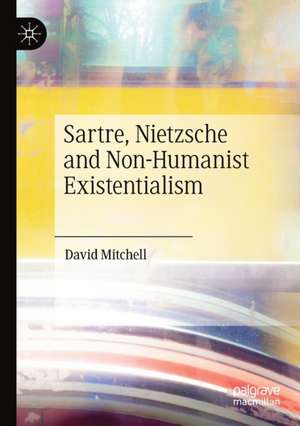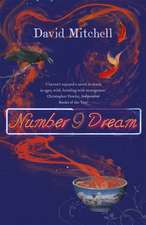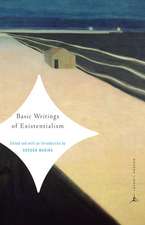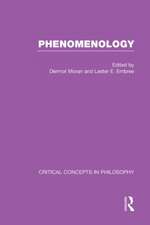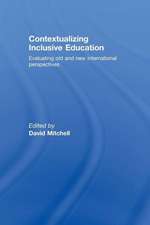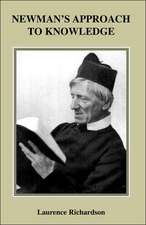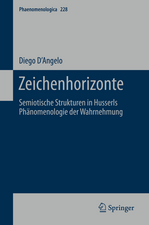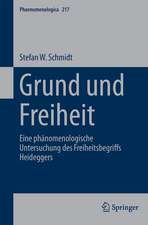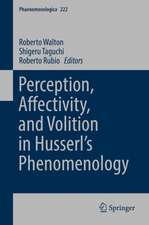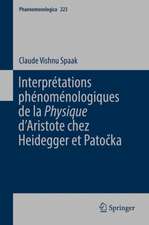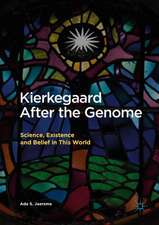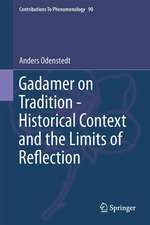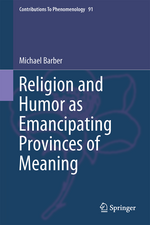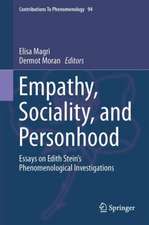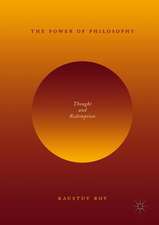Sartre, Nietzsche and Non-Humanist Existentialism
Autor David Mitchellen Limba Engleză Paperback – 12 apr 2021
Through a lucid and thought-provoking exploration of the concept of perversity in Sartre and Nietzsche, Mitchell argues that understanding the human as a ‘perversion’ of something other than itself allows us to have a philosophy of the human without the humanist subject. In short, through perversion, we can talk about the human as not merely having a relation to the world, but of being that relation. With an explicit defence of Sartre against the charge of humanism, accompanied by a novel and distinctive reinterpretation of Nietzsche, Mitchell recovers an existentialism that is at once both radical and philosophically relevant.
| Toate formatele și edițiile | Preț | Express |
|---|---|---|
| Paperback (1) | 521.42 lei 6-8 săpt. | |
| Springer International Publishing – 12 apr 2021 | 521.42 lei 6-8 săpt. | |
| Hardback (1) | 525.54 lei 3-5 săpt. | |
| Springer International Publishing – 12 apr 2020 | 525.54 lei 3-5 săpt. |
Preț: 521.42 lei
Preț vechi: 613.43 lei
-15% Nou
Puncte Express: 782
Preț estimativ în valută:
99.79€ • 103.79$ • 82.38£
99.79€ • 103.79$ • 82.38£
Carte tipărită la comandă
Livrare economică 14-28 aprilie
Preluare comenzi: 021 569.72.76
Specificații
ISBN-13: 9783030431105
ISBN-10: 303043110X
Pagini: 192
Ilustrații: IX, 192 p.
Dimensiuni: 148 x 210 mm
Greutate: 0.25 kg
Ediția:1st ed. 2020
Editura: Springer International Publishing
Colecția Palgrave Macmillan
Locul publicării:Cham, Switzerland
ISBN-10: 303043110X
Pagini: 192
Ilustrații: IX, 192 p.
Dimensiuni: 148 x 210 mm
Greutate: 0.25 kg
Ediția:1st ed. 2020
Editura: Springer International Publishing
Colecția Palgrave Macmillan
Locul publicării:Cham, Switzerland
Cuprins
1. Introduction: Existentialism and Humanism.- 2. Nietzsche's Non-humanist Existentialism: Perversity and Genealogy.- 3. Nietzsche's Non-humanist Existentialism: Secondary Perversion and the Slave Revolt.- 4. Sartre, Nothingness and Perversity.- 5. Sartre, Perversity and Self-Evasion.- 6. Sartre, Perversity and Self-Deception.
Notă biografică
Dr David Mitchell received his PhD from the University of Liverpool, UK. Since 2015 he has been working as a lecturer and researcher at the University of Johannesburg, South Africa.
Textul de pe ultima copertă
This book argues that existentialism’s concern with human existence does not simply make it another form of humanism. Influenced by Heidegger’s 1947 ‘Letter on Humanism’, structuralist and post-structuralist critics have both argued that existentialism is synonymous with a naïve ‘humanist’ idea of the subject. Such identification has led to the movement’s dismissal as a credible philosophy; this book aims to challenge such a view.
Through a lucid and thought-provoking exploration of the concept of perversity in Sartre and Nietzsche, Mitchell argues that understanding the human as a ‘perversion’ of something other than itself allows us to have a philosophy of the human without the humanist subject. In short, through perversion, we can talk about the human as not merely having a relation to the world, but of being that relation. With an explicit defence of Sartre against the charge of humanism, accompanied by a novel and distinctive reinterpretation of Nietzsche, Mitchell recovers an existentialism that is at once both radical and philosophically relevant.
Through a lucid and thought-provoking exploration of the concept of perversity in Sartre and Nietzsche, Mitchell argues that understanding the human as a ‘perversion’ of something other than itself allows us to have a philosophy of the human without the humanist subject. In short, through perversion, we can talk about the human as not merely having a relation to the world, but of being that relation. With an explicit defence of Sartre against the charge of humanism, accompanied by a novel and distinctive reinterpretation of Nietzsche, Mitchell recovers an existentialism that is at once both radical and philosophically relevant.
Caracteristici
Suggests how we can have a philosophy of human existence without the humanist subject Offers new and distinctive interpretations of Sartre and Nietzsche Provides a starting point for a revitalised and philosophically compelling existentialism
